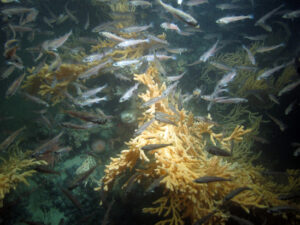
A new NOAA report, State of Deep-Sea Coral and Sponge Ecosystems of the United States, explains advances in deep-sea coral research over the past decade and how this new information is shaping deep-sea conservation. This serves as a ten-year update to the first report, published in 2007, providing the first look at U.S. deep-sea sponge ecosystems.
The report details coral and sponge taxonomy, distributions, habitats, and the effects of human activities. Discoveries include the description of 62 new species of deep-water corals in U.S. waters, and new diverse and dense deep-sea coral “gardens” in every U.S. region, where new evidence points to their role as habitat for fisheries of national and international importance. Revealing the diversity and abundance of our deep-sea coral and sponge ecosystems is critically relevant, as 80 percent of the U.S. exclusive economic zone is deeper than 200 meters, and increasingly subject to fishing and development pressure from oil and gas. The report also shows that managers can work together with fishing industry and the Fishery Management Councils to protect the most vulnerable ecosystems, while sustaining fishing livelihoods.
This research was funded by the Deep Sea Coral Research and Technology Program.
For more information, contact Peter.Etnoyer@noaa.gov
